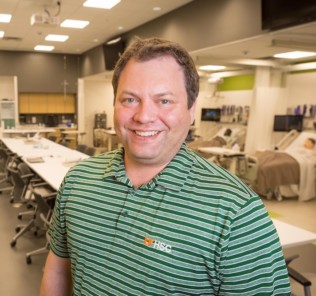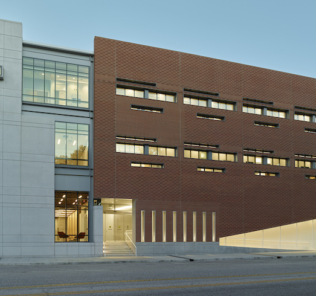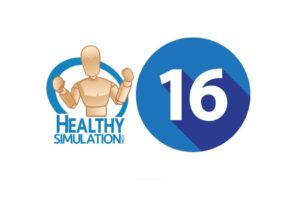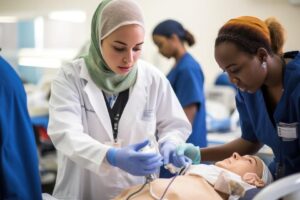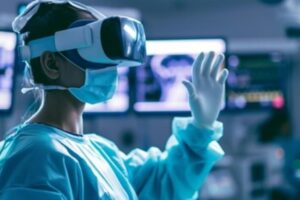SimGHOSTS USA 2018 Opens at UTHSC CHIPS Memphis to Largest Attendance Ever
SimGHOSTS 2018 USA has officially begun in Memphis! Today in Memphis Tennessee the 8th annual SimGHOSTS USA event opened to record breaking attendance at the University of Tennessee Health Science Center’s Center for Healthcare Improvement and Patient Simulation. More than 270 participants came together to network with simulation peers, train and learn from leading community experts, experience the latest healthcare simulation products, and support the professional development of the emerging professional career pathway. Attendees came from all across the United States and farther including from Qatar, the UK, Australia, and beyond!
The show opened to a show of “SimGHOSTS Airways”, where the attendee passengers met Captain Elvis who rock n’ rolled everyone awake and excited for the years special event. Medical Director Dr. Kennard Brown, CHIPS Director Dr. Chad Epps, and Assistant Director and SimGHOSTS Vice President Nick Brauer were thanked for their support to make the event happen.
SimGHOSTS President Ferooz Sekandarpoor introduced the Keynote Speaker David Escobar, Director of Healthcare Simulation for returning platinum sponsor Level 3 Healthcare. David shared his experience of how his career pathway took him from the military, EMS, management, and finally simulation technology operations for Cedars-Sinai Los Angeles (the host of the 2015 SimGHOSTS USA event). David understood what it was like to be “learning on the job”, until he found SimGHOSTS in 2013 where he found “the professional community and training he was looking for”.
Sponsored Content:
David connected with the audience by reminding everyone about the similar struggles we as simulation operators all face as not only do we have solve technical problems but also countless administrative tasks as well. “Aren’t we the real “end users” of simulation technology?” he asked. David’s whole presentation is shared below:
Good morning SimGHOSTS 2018!
First off I want to thank SimGHOSTS for hosting another successful conference. Let’s give a hand for Lance, Ferooz, Kirrian, and the rest of the SimGHOSTS team.
For those that do not know me, my name is David Escobar, I am the Director of Healthcare Simulation with Level 3 Healthcare, who is your platinum sponsor for Simghosts 2018. So, today my talk will require some audience participation. With a show of hands, how many of you are first-time attendees? (show of hands) and, how many of you have been to any prior SimGHOSTS conferences? And… how many of you are not sure where you are right now? Ok perfect. Now I sat out, in the audience, for my first SimGHOSTS back in 2013. Now, fast forward 5 exciting years later and im given the opportunity to stand up here and provide the Keynote speech for SimGHOSTS 2018. I have been looking forward to giving the keynote speech. As I have worked as a simulation tech for several years, I have walked in your shoes.
Sponsored Content:
A little about my background, back in the year 2005, like most 20 years old, I had no idea what I wanted to do with my life. I had worked many different jobs, some in retail, sales, and even security. I had always felt that I should be doing something more. I wanted to help others, and give back, but I just didn’t know which career path to take. Then something happened that put me on my current career path. Hurricane Katrina. Hurricane Katrina, made landfall in August 2005. how many of you remember that? Anyone here from New Orleans, or Mississippi? I was watching the news when it made landfall and saw the heartbreaking, terrible destruction that it caused and how it left our people in need of urgent help, it was then that I felt my calling. So I contacted my local Red Cross chapter and volunteered to go help. A few days later I was sent to Gulfport, Mississippi. Now, let me just clarify… I had no idea what to expect. There was no “gameplan” so to speak, at the time this was the biggest natural disaster in the United States. Everyday was moving into uncharted territory. During my time in Mississippi I came across many people needing medical help, but since I had no previous medical training all I could do was pass out bandages or call for someone else to help. I knew then when my time working with the Red Cross and I returned home, I would go to school to become an EMT. I was originally going to stay in Mississippi for 2 years on a long-term contract, working to help re-establish the local area, unfortunately my family experienced a devastating loss that brought me home much sooner than expected.. My younger brother Daniel, who was 17 at the time was killed when a friend who was drunk, decided to drive him and a couple of other high school friends. The accident claimed the life of my brother and another passenger in the car, Sonia who was also 17, both were seniors. After our family’s loss I immediately came home and that’s set my sights on becoming an Emergency Medical Technician.
I found a local EMT program and started to attend school at night, while working at Starbucks during the day. After I completed the EMT course I went to work for an ambulance company in Los Angeles County responding to 911 calls. I did that for a year before moving into the emergency room to work as an Emergency Department Technician at Pomona Valley Hospital in Pomona, CA. I ended up working the night shift in the ER for a little more than 6 years and during my time I got the chance to see just about anything and everything you can possibly imagine, im an adrenaline junkie so the ER was very exciting for me. As the years went on I was given more responsibility from scheduling for 40 EMTs, to ordering inventory and managing equipment.
One day I was approached by our education department and I was asked if I would be interested in a new position working in healthcare simulation for the hospital. I remember being told very little about what the position would include… all I knew was that it would involve training staff, working with computers and programming, and it would be very hands on. Since the position and the simulation program would be new to the hospital, we would be building this program from scratch.
At the time I had no idea what simulation meant or what I would be doing. Up to this point my simulation training had consisted of using CPR manikins or using a full body manikin during EMT school that offered no feedback or any real features, I learned by having to ask my instructor if the patient breathing, if they had a pulse, and what injuries do I see.
I remember thinking how would I adapt to the new position? where would I go to get training? am I qualified to run a simulation? I had lots of questions but found very few answers. I started touring local programs and connecting with other sim techs. During one of my tours, I was told about an organization called SimGhosts and how it was specifically for people doing the same job as me. So I submitted my request and I had the opportunity to attend my first SimGhosts conference in San Antonio, Texas in 2013. Attending the simghosts conference provided me with a new perspective of our simulation community, it was huge, there were dozens of vendors, specialized equipment, and techs with all kinds of backgrounds. There were classes for beginners to advanced. This wasn’t just some job that I decide to take, this was going to be my career. I continued to work at Pomona Valley for one more year before accepting a position at Cedars-Sinai Medical Center in Los Angeles, CA. During my time at Cedars-Sinai I had to the opportunity to grow professionally, I passed my CHSOS exam, I learned 3d printing and helped with numerous organizational committees for healthcare simulation. I worked there for almost 3 years before joining the Level 3 Healthcare team in 2017. In the 18 months since I was hired, I have been promoted from a subject matter expert, to now overseeing our heathcare simulation division for north america.
So why talk about my background? Like most of you I didn’t just start off working as a sim tech. I came from a different job, for me it was healthcare, pre-hospital and emergency. But for some of you its IT, AV, nursing, or something completely different. We also go by many different titles, sim tech, sim specialist, operations specialist, and last Simulationist, that one is from the SSIH dictionary. That is what makes our community so unique, we come from many different backgrounds and work in many different environments but we’re all here to help make a difference. The ideal background for our job is a highly debated topic, with schools of thought to support any of the ones I just talked about. So much discussion has been focused on the ideal background, that we tend to forget that almost all of us will be different.
How many of you are from a Nursing Program, Medical School, EMS, or Hospital program, how many of you are from a program I didnt list?. And the programs starting to utilize simulation is continuing to grow. I have even come across veterinarian and high-school programs in the last year.
So this brings me to the title of this talk, “more than just a sim tech, an open opportunity”. How many of you have ever thought, I’m just a sim tech? or, how many of you have been told that you are just a sim tech… I know I have on a few occasions. Some of you might think I am just a sim tech because you want more out of your job, maybe there are few or no opportunities for advancement? or maybe your pay is not where you think it should be, or maybe its because you don’t feel your role is important or valued?
First off I dont like the title of “tech”, from my experience the word “tech” implies you have a single job or have a single role and at some organizations, your pay can be significantly lower than a similar job title with “specialist” in it. We have started to see the community move away from using the title of sim tech and start using a title of operations specialist, simulation specialist, or some other combination of those titles. From experience we all know that, as sim techs, we do not only complete one job in a simulation center. Educating the community is half the battle, letting others know what our jobs really consist of will help improve job titles, pay, and future opportunities. Most of you already work on educating the community, through posts, blogs, and videos. I saw a great video on facebook recently, it was in one of the simulation groups, and it was about what goes into a simple task of emptying the beds, putting manikins away. To some it seems like it would be a simple task, but the reality is there is more than throwing the mankins on a gurney, you need to clean, move, address technical issues and more. Posting that video gave others the opportunity to understand more about what we do each day.
I’m here to say we are more than just a sim tech. Working as a sim tech, we find that our position requires us to fill multiple roles, that “other duties as assigned” on our job description tends to grow quite a bit as the time goes on. We troubleshoot IT, AV, and manikin issues, order supplies, stock cart, clean rooms, run simulations, coordinate planning with educators, process reports, fill in as actors, fabricate, become do it yourselfers, and of course run simulation scenarios. And I’m just skimming the list of what our jobs entail. We all know there is so much more we do in the course of our day. But despite the added value we bring to the community, there are some of you who may have experienced or will experience roadblocks during the course of your career. Often, our community can focus on the letters after our name, or what college degrees you have, or what is your job title. We can even be excluded in certain activities or responsibilities because some of us can lack similar education as our co-workers. Simulation deals with teamwork and communication, we preach those objectives daily, but we can easily forget to apply those principals to our teams as well.
I am asked often about when an organization is starting a simulation center what should they budget for. My first answer is staff. Hiring an experienced simtech will help to ensure your program will grow and be successful. Who better to help with equipment purchases, staff hiring, or simulation center layout and design. Instead of focusing on our weakness we need to promote our strengths.
As a sim tech we have many strengths:
Communication. We all know from working in simulation that communication is key to ensuring a positive environment. We need to communicate with not only with our co-workers, but also management, not just for our center but also organizational leadership. We communicate when we give tours to internal and external visitors, I have often joked that I need to add “tour guide” to my resume. During tours we have to describe learning objectives, practical examples of how simulation is used, often this is to groups that may have had no previous experience with simulation. How does this relate to healthcare, and day-to-day numbers (attendance, staffing, etc)
Problem Solving: this should be standard on all of your resumes. Since all of your centers can be using equipment differently based on your learners and objectives. We all find ourselves pushing what the equipment can do, versus what it was designed to do. With that, we have to problem solve not only technical issues, but also designing and increasing realism and efficiency. How many of you participated in the hackathon last year at SimGHOSTS? Anyone here from the winning team? For all the teams involved they were able to accomplish some much in a single day. Who better to design new products or improve current ones, then this group right here.Willingness to learn. This skill goes right into what we do. All of us here are in a constant state of learning. We get new equipment, we included a new department to use simulation. We get tasked with improving center operations. We all never stop learning. The fact that all of you are here now is proof of that.
Ability to work under pressure. I enjoyed working on the ambulance and in the ER due to not knowing what my shift would consist of, would there be a shooting, stabbing, cardiac arrest, or would I end up just transporting patients to the floor all night. The same can be said about being a simtech. We are constantly being challenged with new scenarios, technology, and interacting with learners for all types of backgrounds. Being able to adapt to new obstacles quickly, and work in a high stress environment is something we all do. How many of you have been in the hot seat for a high-stakes scenario and everything stops working 5 minutes before the start? Hopefully no one throws their hands up and storms off, although im sure we have all felt that way more than once. Instead we take the challenge head-on and ensure we see it through.
I have come across many different job descriptions and have helped write job descriptions, and it is always interesting to see some of the skills required to work as a sim tech, a bachelor’s degree, advanced certification in AV, IT or healthcare, minimum of 2-5 years experience, CHSOS or CHSE. Prior experience in operations, patient simulator repair certification, oh and the position is considered entry-level and so is the pay. Its a highly debated topic with no definite right answer, there are many factors that go into that a sim techs role will be at a specific organization. So the question has to be asked, the job descriptions usually cover all the required skills for a sim tech position, but more often then not the pay is not at the level it should be.
Let’s talk about what goes into this type of sim tech background. We as sim techs are truly multi-rolled or a jack of all trades. To accomplish our daily work we have to master several different backgrounds (AV, IT, Healthcare, operations, business to name a few), now those backgrounds normally would take several years in each to gain some significant experience. Think of it this way, if im working in a hospital, if I needed help with a computer issue, I would reach out to IT, or IS (depending of what your IT department is called), now if its a wireless issue, there can be a wireless team that would respond separately, and thats just if the issue is IT related, if you needed AV help, same process. Now that type of workflow, each department handing issues that they have the staff and training in to deal with each issue is not uncommon, regardless if its a hospital, medical school, or university.
For simulation centers, who is usually the one answering the call regardless of the issue? You. We have grown our position from running manikins to be the all knowing, fixer of anything and of course do it yourselfer.
Each different background whether its IT, AV, or healthcare has a recognized training program and some have industry specific certifications. For many of us we usually have to quickly adapt an attitude of sink or swim, where we dont have the luxury to say I cant get to that today or I dont know how to do that, we are forced to quickly learn or risk impacting the center operations or even worse impact our job. Some of us are fortunate to work at a center that can employ multiple staff members to help with the workload. For some of us, we are one-person show. I started that way, in my first position my office was the storage/training/debriefing room.
So all this brings up the important question, where can we go from here. Being a part of this community has provided us with the opportunity to help shape its direction. As more simulation programs open their doors, the need to staff with simulation techs will continue to grow. With our skill set there are countless opportunities to make an impact in, from job advancement, to new positions such as a healthcare consultant, operations manager, or sales representative. As simulation centers integrate more cutting edge technology such as 3D printers, VR and AR headsets, sim techs are in a position to design, create and expand how these technologies will be used. I have already seen this community create new skills trainers, replacement parts, and software to improve daily operations.
Over the last several years I have been excited at the professional growth in our community. We have our first certification specifically for the simulation techs & specialists, the Certified Healthcare Simulation Operations Specialist (CHSOS) through SSIH. There have been standards completed with several organizations such as INASCL, and SSIH. There are several annual conferences dedicated to the sim techs and specialist community, here we are now at SimGhosts with 200 attendees, attendance continues to grow each year.. We also now have certificates and associate’s degrees offered at the college level and some of those programs are being taught by members of this group. These courses are encouraging more individuals to enter this field without prior experience. We are now seeing high-school programs adding simulation centers to their campuses, so even high-school students can start down the healthcare road early on! Also, I am seeing more and more regional groups starting up with the goal of sharing information and connecting with others in the community. The fact is, we are not going anywhere. We are definitely here to stay.
There are a couple of things I want to challenge this group with in closing
1. Be active. I challenge this group to get more active with the community. Some of you are new, and some of you have been a part of this community for many years. Use your knowledge to help others find solutions or mentor others so they can grow in this field. Get online and be active in community forums, post to linkedin, facebook or twitter. Write blogs, publish DIY videos. Take the opportunity to present at local and national conferences.
2. Get certified. With the creation of the CHSOS certification, we now have our own industry related certification. Help the CHSOS grow by pursuing it. If you are not sure what to study or how to prepare, im sure there are some videos out there to help you get started. If you already have your certification, get involved in helping others achieve theirs as well.
3. And last I want to you to challenge yourselves. Push yourself into unfamiliar territory. If you want to learn new skills, do it! We will only continue to grow yourselves if we continue to develop our profession and never stop learning. Do not ever sell yourself short.
So always remembers its not where we come from but where we are going.
Thank you everyone, and lets go have a great conference!
—-
David challenged us to continue to support ourselves and our community!
Gold Sponsors Laerdal Medical, CAE Healthcare, and EMS SimulationIQ provided additional plenary sessions which will be covered and shared as well throughout the 4 day conference.
Follow along this week on Twitter with #SG18USA!
Lance Baily, BA, EMT-B, is the Founder & CEO of HealthySimulation.com, which he started while serving as the Director of the Nevada System of Higher Education’s Clinical Simulation Center of Las Vegas back in 2010. Lance is also the Founder and acting Advisor to the Board of SimGHOSTS.org, the world’s only non-profit organization dedicated to supporting professionals operating healthcare simulation technologies. His co-edited Book: “Comprehensive Healthcare Simulation: Operations, Technology, and Innovative Practice” is cited as a key source for professional certification in the industry. Lance’s background also includes serving as a Simulation Technology Specialist for the LA Community College District, EMS fire fighting, Hollywood movie production, rescue diving, and global travel. He and his wife Abigail Baily, PhD live in Las Vegas, Nevada with their two amazing daughters.
Sponsored Content:





